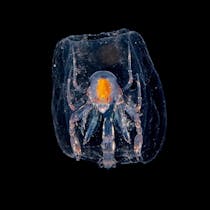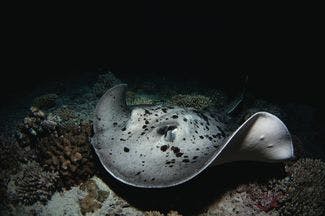Free Shipping on orders of $49+ | Signup for Direct Rewards
Free Shipping on orders of $49+ | Free Store Pickup | Signup for Direct Rewards
Free Shipping on orders of $49+ | Signup for Direct Rewards
Free Shipping on orders of $49+ | Free Store Pickup | Signup for Direct Rewards

Good, grab your dive lights because we’re about to discuss one of the scariest scuba diving experiences one can have—night diving. But while night diving can seem like a frightful experience from an onlooker’s perspective, it’s not nearly as scary as it seems. There are two main reasons scuba diving at night could be unnerving: if you’re afraid of the dark or if you’re woefully unprepared. Since you’re considering submerging into the inky black liquid of the water with only your dive light for illumination, let’s discuss ways we can better prepare for this experience so that it’s more fun than scary. Additionally, we will discuss the terror (*cue the scream of horror) that can accompany the fascinating activity that is night diving and the animals that you may see—or, in the very least, sense their presence somewhere near you… watching you. Let’s dive in!

Image credit: André Johnson / OceanPro Photography
Honestly, there’s nothing quite like floating weightlessly in a foreign environment in complete and total darkness to get your adrenaline (and imagination) going. You can only see as far as your dive light can guide you. What lies beyond and around you? Can you sense it, the... creature that’s watching you? The fact is that there is a plethora of animals that can see you far better than you can see them. The unknown is the true fear here, and your imagination can run wild with it if you allow it. If you find yourself a wee anxious at times, it may be a good idea to start exploring meditation. Getting familiar with meditation and applying its methods before and during your dive if needed can help to keep you centered and calm when your imagination is tempting you towards fear.
“Realize that your fear of the dive is much worse than the dive itself. Fear tends to dissipate for nearly every nervous night diver as soon as they go underwater.” —Chantae Reden
As a new night diver, you may already be getting a bit nervous just thinking about it. You may be thinking,why would anyone submerge themselves in total darkness with no clue of what’s around them? Don’t worry, those are totally natural ways to think and feel. Maybe you recall that terrifying night diving scene fromJawsand have sworn it off for good. Just as a reminder,Jawswas a horror movie. It was designed to scare the bejesus out of you. If you, like me, happened to jump about a foot out of your seat in fright at that scene, well by golly it worked didn’t it? But your night diving experience willnotbe like that scene fromJaws. Ideally, your night diving experience will not be like any scene fromJaws—remember it’s fiction, fiction, fiction. If you prepare correctly and train appropriately, your experience will ideally be less like a horror movie and more like a fantasy film with fascinating creatures, brilliant colors, and well, you can fly!

Image Credit: Joseph Tepper
Here’s a benefit of night diving: If you find that bugs are a bit of a phobia for you, this will be a good way to start getting over that fear. While actual insects will not be present underwater, you may find many creepy crawly creatures exploring the reef such as lobsters, crabs, and shrimp. While you most certainly see these animals during the day, you’ll find that they’re much more active and abundant at night. Additionally, this is an excellent opportunity to observe diurnal animals, like many fish, sleeping the night away in little nooks and crannies of the reef. Remember, just like you don’t like to be frightened, they definitely don’t like to be frightened. So don’t hold your light on any animal for too long and don’t shine the brightest part of your light on them either. You may also see on your moonlight dive plenty of octopuses (do not fear, this is the correct plural spelling of octopus), eels, manta rays, and more. Of course, this all depends on what kind of night dive you’re doing and where you are in the world.
Now you may not know this but sharks are nocturnal animals. You have a higher chance of catching a glimpse of these incredible creatures while cruising the seas at night. Knowing that you may be dealing with more sharks on your dive at night means it’s time to study up on sharks’ behavioral patterns. Before you start jumping into the dark sea, do some sharky research and start studying potential aggressive behaviors and ways to manage them when possible for optimum safety.
So we’ve covered what we’ll see and what it may feel like to go night diving. What, then, shall we do to prepare for such a seemingly-terrifying-but-not-actually-as-terrifying-as-it-sounds adventure?
First things first: Gear up! You’ll need your daytime scuba diving gear, of course, (BCD, mask, snorkel, fins, wetsuit, etc) but you’ll also need dive lights—one primary light and one back up light at least. You’ll need to make sure your lights have lanyards so that you can strap them to your wrists for a more secure hold. Make sure you know where your secondary light is and practice grabbing a few times on land or on the boat before you get in the water. It’s also a good idea to have some sort of strobe or signal light to clip onto your tank or BC so that your dive buddy or instructor can better find you.
Speaking of finding things, a compass is essential to have on a night dive. Diving in the dark can be disorienting, so knowing which direction your boat or the shore is can keep you feeling like you’re on the right track. This seems like an opportune moment to mention that bubbles go up. Yes, we realize you knew that, but it’s good to remember when or if you’re ever feeling disoriented in the water. It can also be difficult to tell how deep you’ve gone on a night dive, so grabbing a dive computer (with a backlight) can help you stay clear on where you are in space and how you’re doing on tank pressure. Some additional convenience and safety gear you’ll be glad you have include a bright and reflective SMB (surface marker buoy), a sound signaling device for both above and below the water (like a whistle and an underwater noise maker), and a retractor for making it easy to grab your secondary light or dive slate.

Image Credit: Jason Isley / Scubazoo
Secondly, get trained! Sometimes all the research in the world just won’t cut it. Getting a hands-on learning experience is vital to build confidence in the water at night. Who better to guide you through the pitch black underwater world than someone who’s done it a considerable number of times? Get in touch with your local dive instructor and schedule a night dive with them. They can make you feel far more comfortable while you’re exploring new, spooky worlds. Additionally, it helps to visit the dive site you’ll be exploring during the day first before diving it at night so that you’re more familiar with the area.
Finally, grab a dive buddy. When it comes to diving at night, you’ll need someone there with you to better ensure each other's safety. Back on the subject of horror movies, we definitely don’t want our dive buddy falling into the “be right back” trope. It is paramount that you and your dive buddy continue to keep an eye on each other while diving—this is where your additional lighting on your tank or BC can be especially useful. As an important side note, do not shine your dive light into your dive buddy’s eyes. It can temporarily blind them and make the experience far more terrifying for them.
You’ll also need to learn to communicate a bit differently at night. If you’re more comfortable with the scuba diving hand signals, you could shine your light on your hand to communicate as needed. But at night in the water, it may be easier to use your dive light to chat with. For instance, waving your light back and forth towards your dive buddy can help get their attention. Waving the light vertically up and down can signal a potential issue, while waving your light in a circle can indicate that everything is okay. It’s a good idea to practice these signals with your dive buddy on the boat beforehand to be sure you’re both on the same page.
In conclusion, don’t make night diving scarier than it needs to be by being unprepared. Many characters in horror movies are rarely prepared for the surprises they face. As a result of their lack of preparation, they tend to panic and make ridiculous decisions—honestly though, why run up the stairs of the haunted house?? Don’t be a character in a horror flick. Get geared up and practice the important skills you’ll need for scuba diving at night.
To finish off our frights, let’s have a [dun, dun, DUN] pop quiz!
Because nothing is scarier than a POP QUIZ!!!
Answer key: 1. d, 2. c, 3. a, 4. c, 5. b
By Amy Baldacci
While you wouldn’t want your very first open water dive to be at night, if you’re diving with an experienced instructor who’s teaching you about night diving, a beginner scuba diver with at least a few dives under their weight belt could start exploring shallow water night diving.
It is highly recommended to get training from a certified instructor for night diving so that you are better prepared for the experience.
Yes, you’ll need dive lights and other accessories! You’ll need a primary and secondary light, a compass, and some safety strobes to attach to your tank so your dive buddy can clearly see you. Also, make sure your dive computer has a backlight so you can see it clearly.
Night diving can be dangerous if a diver isn’t properly trained for scuba diving and night diving specifically. If you’re not keeping an eye on how deep you’re diving, which direction you’re heading, and where your dive buddy is, you’re entering a danger zone you’ll wish you’d have prepared a little better for.
The fear that accompanies night diving is simply the fear of the unknown since we can only see what our dive light sees. Once you get in and get acclimated to the darkness, night diving really isn’t that scary at all and can actually be quite peaceful.